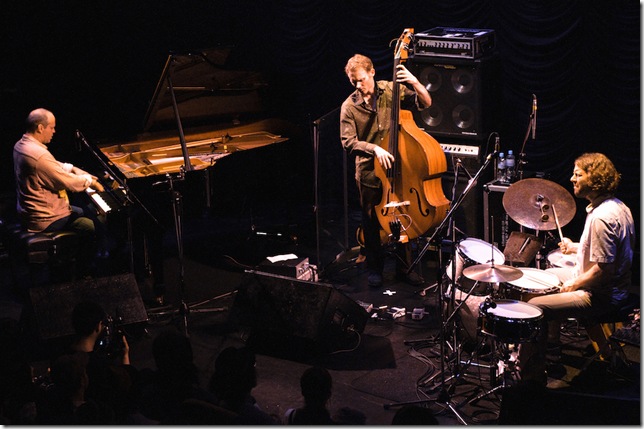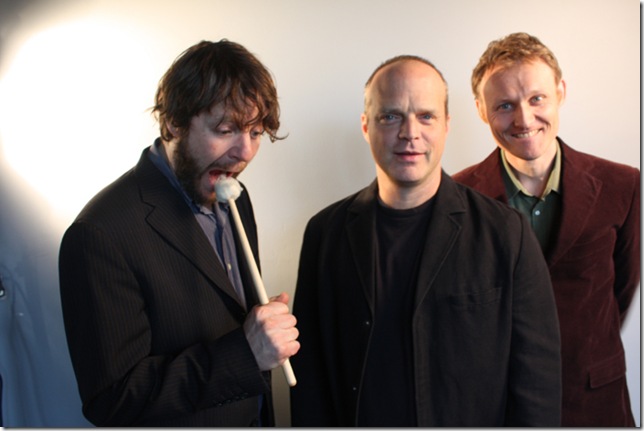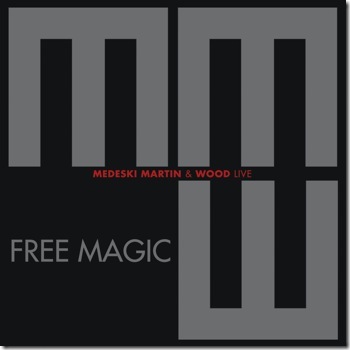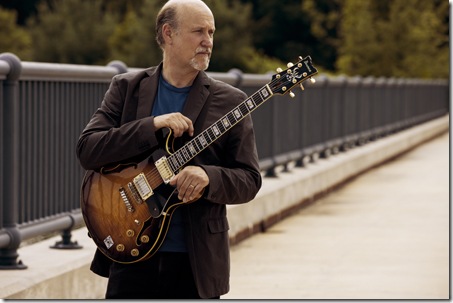It isn’t exactly John Belushi’s “seven years of college” quote from Animal House, but Medeski, Martin and Wood keyboardist John Medeski has an admission regarding his own higher learning at the New England Conservatory in Boston.
“It took me about five-and-a-half years to finish there,” he says with a laugh. “I had a scholarship, but I got so busy that I dropped to part-time status and struggled to get my degree. It didn’t make sense to me, since I was gigging seven nights a week around Boston by my third year there.
“But going to NEC allowed me to study with amazing teachers like Dave Holland, George Russell, Bob Moses and Ran Blake. So that was a great motivator, along with my parents. They were nervous, since they were paying for it. I really did it to make the folks happy.”
Medeski’s parents still live in Fort Lauderdale, where they’d moved from Kentucky when John was 4 years old. That allowed him to advance through the music program at the pre-K-12 Pine Crest School there, right up until he left for NEC, although he also had plenty of outside lessons in South Florida.
“I did a lot of my piano studies away from the school,” he says. “I’d go to Florida Atlantic University to study with instructors like Alex Darqui, Bill Prince and Lee Shaw, who were great. Lee also hooked me up with Chuck Marohnic, who was getting his master’s at the University of Miami and went on to become the head of Arizona State University’s music department.”
Then there were the unofficial lessons provided by playing with some of the jazz heavyweights who lived in South Florida during the 1970s and 1980s, like bass icon Jaco Pastorius (1951-1987), multi-wind-instrumentalist Ira Sullivan and guitarist Randy Bernsen.
“Jaco wanted me to do a tour of Japan with him when I was 16,” Medeski says, “but my mom wouldn’t let me go. We’d played here and there, and he was still coherent at that time, if raging a bit. I saw him in a lot worse shape in New York City later on. Ira was hard not to run across back in those days in South Florida. We only played together once or twice, but I went to see lots of his shows. And I’d see Randy all the time. I’m on his latest record [the 2012 EP APPteaser], and MMW recorded overdubs at his studio for our 2008 children’s CD, Let’s Go Everywhere.”
“Medeski’s now the prince of the jam bands,” says Bernsen, a Fort Lauderdale resident who’s a decade older than the 47-year-old keyboardist. “But he used to sneak into the Musicians Exchange in Lauderdale to hear myself and Jaco when he was an underage teenager.”
“I was actually also playing at Musicians Exchange while I was underage,” Medeski says.
Bernsen’s jam band royalty reference — not to mention the fact that MMW actually released a children’s CD ― shows how far the trio has come since forming in 1991. The keyboardist met bassist Chris Wood in Boston, but it took the two moving to New York City and joining forces with drummer Billy Martin, an expert in African and Brazilian rhythms who was referred by Medeski’s NEC instructor Moses, to complete the puzzle and further delay that college degree. Medeski also decided to throw away his tuxedo once he hit the Big Apple.
“I’d found it was easy to work every night if you were willing to play all kinds of different stuff,” he says. “Which I enjoyed, because I love to play. I still do different styles with a lot of different people, which is great, but I realized that you also have to make time for yourself and your own thing. You need to have time to have a life. A social life, a spiritual life.
“If you don’t, you’ll have nothing to offer in your music. So I just made a commitment to throw away my tux so I couldn’t take those social kinds of gigs,” he said.
Wood and Medeski instead gravitated toward New York’s downtown arts scene, which was more concerned with musical honesty and freedom than genre categorization. Sharing stages with John Zorn, John Lurie, Marc Ribot and Steve Bernstein allowed the keyboardist to fully employ the open-minded approach of the Third Stream program he’d studied within at NEC. And MMW’s first jam, at Martin’s Brooklyn apartment, showed that all three musicians were on the same expansive page.
MMW employs a jazz spirit, yet refuses to be confined by jazz convention. Such an open-minded approach beat the odds as they rose to stardom through the 1990s by fusing jazz, world, funk, pop and blues styles to attract everything from jazz musicians to jam band fans and alternative rockers.
Throughout MMW’s career, Medeski has blended acoustic piano with electric Hammond and Wurlitzer organs, synthesizers, clavinets and mellotrons while Wood has played acoustic and electric basses and Martin drums and percussion. Yet Medeski had received a scholarship to NEC to study piano, only discovering a love for the Hammond B3 once he got there.
“I had a Fender Rhodes electric piano in Florida,” he says, “because there wasn’t a piano in Musicians Exchange for a long time. I found a Hammond at the school, covered in dust; turned it on and realized what a monster it was. I’d played one before, but never fully explored it. I couldn’t believe how many sounds I could get out of it. Martin calls me a ‘key-jay.’
“But with MMW, I started playing electric keyboards because I was having to use digital pianos on tour, and hated them. It became a chicken-or-the-egg situation. The organ was kind of a necessity because of touring, but the music certainly benefited from it. And the instrument definitely seemed to help attract a wider audience.”
All-acoustic releases nonetheless dot the otherwise electric acid test landscape of the MMW discography. Their first and their latest, in fact ― the 1992 debut Notes From the Underground and the similarly enticing 2012 live CD Free Magic ― form all-acoustic bookends to their recording career. In between, there’s been a delicious mix of electric and acoustic mayhem.
“It’s always been a blend,” Medeski says. “Our second CD [1993’s It’s a Jungle in Here] was about half piano; half electric keyboards.”
That sophomore effort was both defining and defiant, with a horn section; guest spots by guitarist Ribot, and originals by all three band members that ranged from funky to frenetic. As did the covers, which included material by John Coltrane, King Sunny Adé, and a statement-making medley fusing Thelonious Monk’s Bemsha Swing with Bob Marley’s Lively Up Yourself.
The new Free Magic live CD, recorded during the trio’s 2007 acoustic tour, closes with a reading of that album’s Where’s Sly (featuring a lengthy Martin drum solo) and a Charles Mingus/Sun Ra medley, Nostalgia in Times Square/Angel Race, that further illustrates its broad palette.
The subsequent 1995 CD Friday Afternoon in the Universe and 1996 disc Shack-Man, plus relentless touring, made MMW genre-defiant stars and put them in the unique position of being able to form their own creative agenda.
They formed their own 15-year-old Indirecto label to release the freely improvised 1997 CD Farmer’s Reserve, which was followed by a wide range of Blue Note efforts (the explosive Combustication with guest DJ Logic; the all-acoustic live disc Tonic, acidic The Dropper, and sublime Uninvisible, with guests from Bob James to Col. Bruce Hampton) before their next Indirecto offering, 2002’s live Electric Tonic.
The trio had also started to branch out by then, led by Medeski’s 1994 set with a guitarist he’d met at NEC, David Fiuczynski. Lunar Crush blended elements of MMW, Fiuczynski’s alt-funk band Screaming Headless Torsos, and both versions of the Tony Williams Lifetime, to searing effect.
Wood has alternated between the trio and the rootsy Wood Brothers, with brother and guitarist Oliver Wood, for the past seven years. And Martin’s side projects range from educational books and DVDs to his recent duo with San Francisco Hammond organist Wil Blades.
A weeklong MMW residency in December at the Blue Note in New York City featured different special guests performing with the trio each night, from percussionist Aiyb Deing to guitarists Ribot and Nels Cline and saxophonists Bill Evans and Marty Ehrlich.
“It’s inspiring us to do further collaborations,” Medeski said in the middle of that very week. “Last night was the very first time we’d ever played with Nels, but it was like we’d played together for 20 years. He’s an unbelievable musician. So was Dieng, who we just played with for the first time, but could easily be a fourth member of the band. Ribot is one of our favorites from way back; Evans is someone we’ve worked with occasionally over the past couple years. And Marty is someone who I think all three of us have played with before, just not as MMW.”
The trio’s most famous collaborator, former Miles Davis guitarist John Scofield, now turns MMW into an occasional quartet.
“He called our 1-800 fan line, back before the Internet,” Medeski says. “We were in Hawaii, where we used to go every winter for a break from touring. Chris and I went into town for supplies, checked messages, and we hear, ‘Hey, this is John Scofield and I really dig what you guys do and would love to get together.’ We didn’t believe it, but we called back and it was really him.”
Scofield’s next CD, A Go Go (1998), was such a subtle, funky gem that the foursome recorded the 2006 follow-up Out Louder (now under the name Medeski, Scofield, Martin and Wood), toured in 2007, and released a 2011 double-CD document of that tour called Live: In Case the World Changes Its Mind. The quartet basically convenes whenever its busy separate schedules allow.
“We did a couple gigs with Sco in Colorado recently,” Medeski says. “We’re talking about doing another studio record, which would be great. I was a fan of his before he was with Miles, let alone with us.”
Twenty-two years after forming MMW, did Medeski ever envision the trio still existing, let alone recording and touring with a jazz icon like Scofield?
“No way,” he says. “I guess time flies when you’re having fun. We still love playing together, and things are still growing and always creative. There are bands where members don’t even like each other or talk to each other, yet show up on stage together to make money. We’ve never done that. We never would.
Medeski, Martin and Wood perform at 8 p.m. Sunday at Revolution Live, 100 SW 3rd Ave., Fort Lauderdale ($37.54, 954-449-1025).



